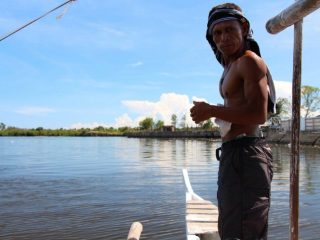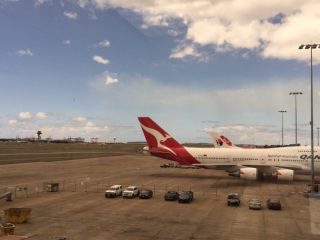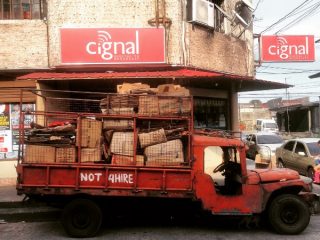I walked into the bathroom yesterday morning and, as per normal, there was no water in the pipe that hangs in through the bathroom window. For the first few waking hours of each day, there is no running water from any of the taps around the house. For the remainder of the day, the pipe into our bathroom is the most likely to ‘go without’. Fortunately, we anticipate this, so we store a huge bucket of water. The water is only like to flow between about 9pm — 5am.
After a leisurely breakfast, a Philpost postal courier arrived with two packages — the first was a gift I had sent for my partner’s birthday, but it took over 6 weeks to arrive — it was despatched from Singapore and got to Philippines within 4 days, but then took five and a half weeks to get from Manila to Lucena (about a 3–4 hour truck drive). The second was a Registered Mail item from Australia, which was supposed to be delivered “within 3–10 days” but took 18 days — once again, it was in the Philippines within 2 days, but took a further 16 days to get from Manila to Lucena.
Once the courier had left, we did a few household chores and, as we were looking at the ‘lean-to’ laundry, I noticed that the tin roof is not supported in one corner and could collapse at any moment. The original structure was a bizarre hotch-potch of light weight timbers knocked together and supported on a few coconut logs, which in turn were embedded in concrete and had now rotted from the concrete up. There is something akin to a rangehood, constructed out of timber and corrugated iron, dangling and dragging the roof down, and all the roofing, gutters, and flashing are rusted and disintegrating.
I then headed up the street to do a little shopping. With the exception of some of the larger stores, most deal only in cash. So I stopped at Maybank to use their ATM. I’d heard that, unlike most other banks which charge Php 200 to withdraw cash using a foreign card, Maybank don’t charge a fee. The reality was not quite as attractive as that — in fact, they apparently don’t support withdrawals from foreign cards at all (unless it’s a Maybank card from another Asian country). Unfortunately, the ATM doesn’t tell you it’s not supported — it just says “Bank issuer unreachable”.
When I got home in the evening, I wanted to spend some time catching up on emails and showing my family some Youtube videos. But by 7:30pm the connection had slowed to a crawl. We use a Globe wi-fi solution that connects to the 3G network, but it’s so slow at this time of the evening that Youtube refuses to show video and just plays the audio soundtrack. I tried tethering with my mobile phone, but the speed was still terribly slow, and within half an hour I’d breached Globe’s “Acceptable Usage Policy” which means that the remainder of my 5 day plan is no longer operational.
Given that I’m trying to keep up with my Australian and Cambodian work whilst living here in Lucena, I’ve checked out pretty much every Internet option available — and they’re all dismal. PLDTdsl has a terrible reputation for being as slow as a snail. The 3G solutions from Globe, Sun and Smart have crazy restrictions on them and/or terrible performance. 4G LTE is advertised but in fact doesn’t offer coverage where we are — and even if it did, the plans don’t provide sufficient data allowance for you to be able to do a meaningful amount of work on them. My last hope is broadband fibre, but if I am forced to use PLDT Fibr the cost will be close to $100 per month — a figure which is so disproportionate to the typical income of an average Filipino that it’s ludicrous.
The more time I spend in developing countries, and particularly when I live in a style akin to a ‘middle class’ citizen, the more I’m convinced that there are some basic building blocks for economic growth that should be front and centre of Government and enterprise initiatives, and yet their importance to the welfare of entire nations is not yet being recognised.
- ICT Infrastructure — despite being a global leader in Business Process Outsourcing (BPO), the Philippines’ ICT infrastructure is so inadequate that the average entrepreneurial Filipino is effectively cut-off from meaningful participation in the online, “digital revolution”. Whilst a percentage living in Manila manage to secure remote working opportunities (the Manila infrastructure is passable but by no means dazzling), the vast majority of the Philippines population live in areas which are completely under-equipped. The infrastructure is priced wrong, and is massively over-subscribed, with crippling congestion and unreliability.
- Financial Infrastructure — the banking systems of most developing countries share a common theme of poor integration with global banking partners, expensive fee structures, tedious and out-dated processes and work practices, unreliable private networks, and a large number of bank holidays each year.
- Transport Infrastructure — a universal complaint in all developing countries is the poor quality of the roads. Whether I should blame my slow postal deliveries on poor transport infrastructure, or lazy customs staff, or bureaucracy and inefficiency within the postal service, or all of these factors, it is clear that bad roads and transport systems exponentially increase delivery times and costs in every developing country — Philippines, Cambodia, India, Bangladesh, Ghana, Zambia… I won’t try to list them all — it’s simply a universal truth.
- Civil Infrastructure — one of the most basic needs in every society is water. And with frightening regularity, we hear the same stories in most if not all developing countries — poor water supply (in most cases) and sewerage/storm water (in virtually all cases). Even in urban areas with some semblance of water infrastructure, frequently the implementation is shoddy and reflects short term thinking. Water supply capacity is not keeping pace with population growth. Storm waters continue to flood homes and cities, and yet drainage infrastructure seems not to be a priority. Surely there must be a way to install more durable, long term solutions whilst adhering to a reasonable price point? Do these Governments ever consider “lifetime cost”?
- Poor Quality Standards — a pervasive attribute of both the civil service and private citizens appears to be a complete lack of concern about longevity and quality of products and solutions. Whilst becoming a first time consumer within a market often means initially purchasing at the lowest available price point, this appears to become the cultural norm to the extent that even those with the means still don’t invest in quality — indeed, they may find it difficult to source durable and high quality products even if they were inclined to purchase them. And so, for example, people build large, comfortable homes at considerable expense and yet still install inadequate plumbing and electrical wiring.
Whilst I have not rigorously research and verified the above 5 factors hindering economic growth in developing countries, I believe there is merit to my argument and I exhort social innovators, Government leaders, NGO organisations, and anyone interested in promoting the progress of developing countries to seriously evaluate the benefits of developing and promoting these 5 key factors.


